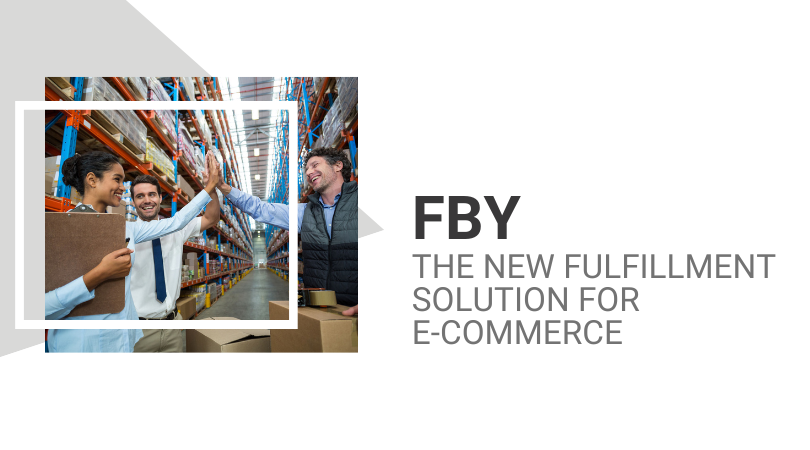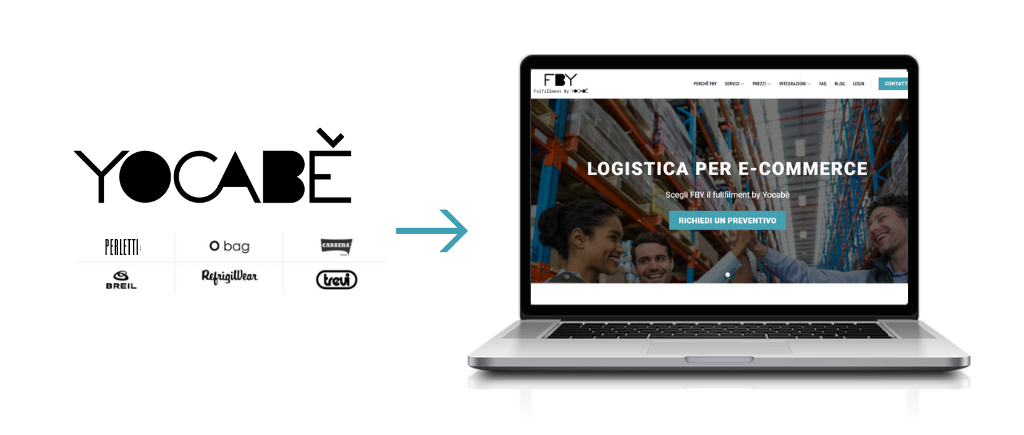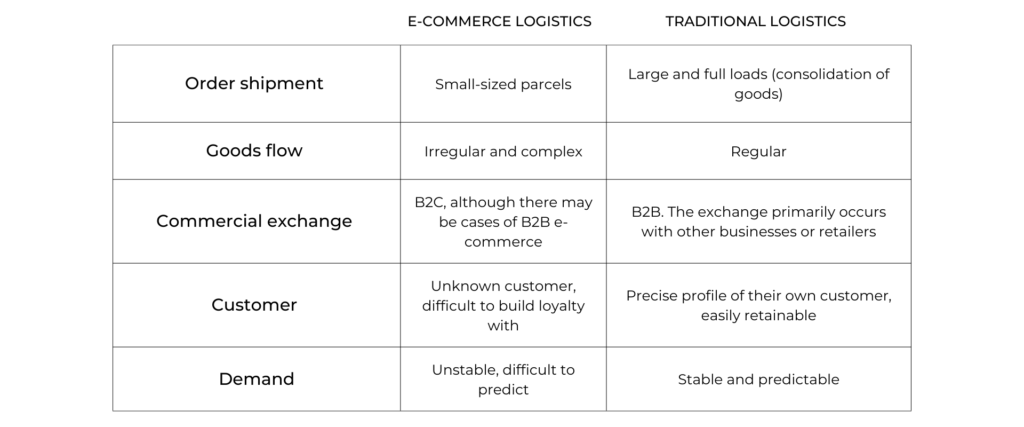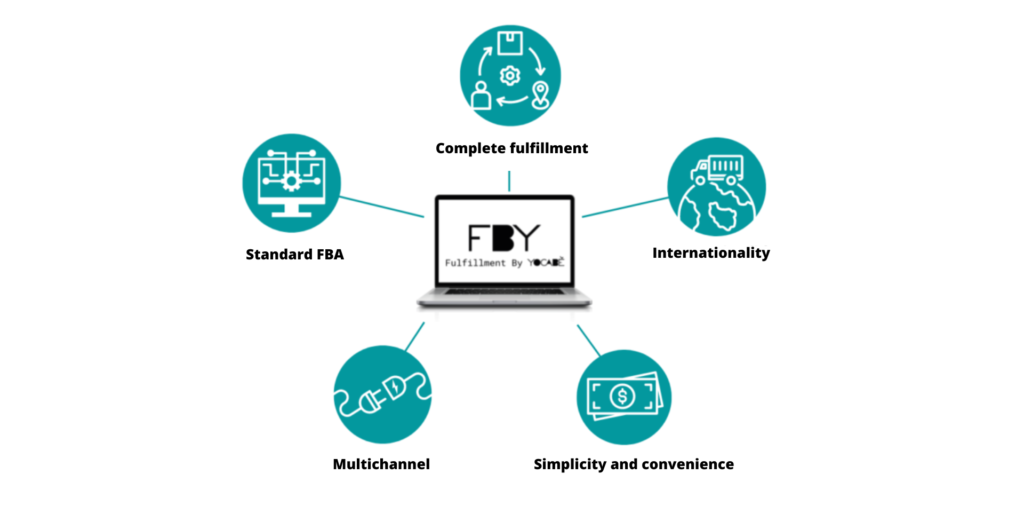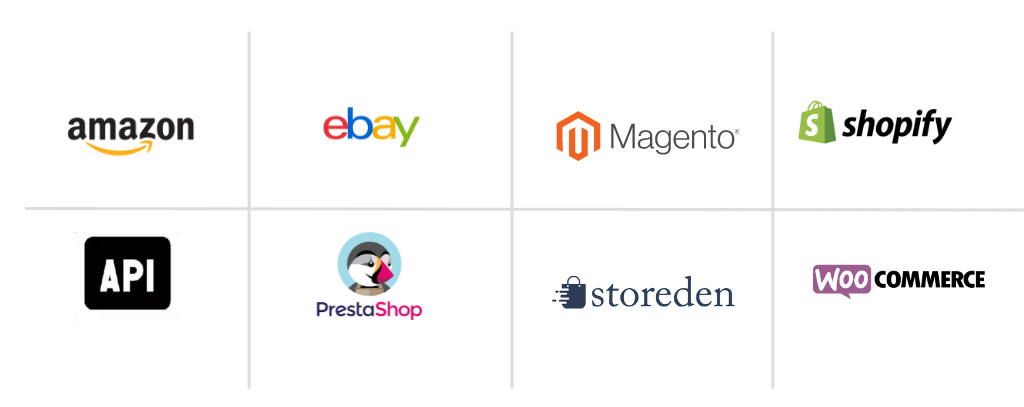Yocabè launches its new order management service: FBY – Fulfillment by YOCABÈ.
The FBY platform aims to create a service for any brand or retailer in various sectors (from fashion to beauty and food), comparable to that of Amazon and Zalando – platforms that have now set the benchmark metrics for the e-commerce industry.
Thanks to Yocabè’s know-how, technology, and logistics infrastructure, FBY can handle all logistical operations: from order collection to inventory management, and from shipping to returns.
DISCOVER OUR E-COMMERCE LOGISTICS SERVICE
The central role of logistics in e-commerce
What happens from the moment an order is placed to the moment it is received is the most important part of the e-commerce logistics process. It is during this phase that all the operations take place, transforming a virtual request into a physical product that reaches the end customer.
From the moment the purchase is confirmed, a series of actions are set in motion that collectively make up the logistics process. It is the responsibility of logistics to manage the entire distribution chain and strategically and practically coordinate everything involved from order creation to delivery.
Managing the logistics of an e-commerce business is a crucial aspect for any company that wants to sell online. It is what makes a difference, not only in terms of customer satisfaction but also for the rapid growth of activities and the overall business of an e-commerce platform. It is a key driver for business success and, as such, cannot be neglected at any time or in any step.
What is e-commerce logistics?
E-commerce logistics refers to the set of activities that range from inventory storage and management to order shipment and delivery to the end customer.
Let’s take a closer look at the various stages to learn more about how the e-commerce logistics chain works.
1.Warehouse management.
A well-organized warehouse is synonymous with functionality, efficiency, and speed in product distribution and storage.
having a complete view of inventory stocks before processing any orders is essential, as is arranging inventory items on shelves and in suitable containers with the correct labels to expedite retrieval. Additionally, optimizing warehouse space allows for accomodating all available items and easily locating them.
2.Goods receiving.
The receipt of goods needs to be planned and coordinated with the rest of the processes in the supply chain to avoid disruptions.
In this phase, it is necessary to implement order control procedures such as parcel lists and goods registration, as well as checking the condition of packaging.
3.Picking and packing.
During this stage, merchandise is retrieved from warehouse shelves, categorized, and packed with the necessary documentation (invoice and packing slip) before being labeled according to courier standards.
To optimize picking and packing routes, it is essential to analyze orders in advance and ensure proper organization of picking stations to efficiently manage merchandise distribution.
4.Shipping and tracking.
After the merchandise is packed, it is sent to a courier for shipment.
In this phase, the customer becomes an actual buyer. A shipment tracking service allows users to receive all the necessary information and track the progress of their order in real-time, from the warehouse to the final destination.
Offering a seamless customer experience, along with multiple payment options such as cash on delivery and prepaid fees, sets a good foundation for improving customer conversion and retention.
5.Delivery and returns management.
The e-commerce logistics process typically concludes with product delivery. Additionally, managing order returns effectively becomes crucial.
Firstly, recording the quantity of returns and the reasons for them, along with automated procedures, is vital for optimizing returns management.
For online shoppers, the ability to return products to the seller is a crucial added value. A well-implemented returns policy holds significant importance and can make a difference in a user’s choice of an e-commerce platform.
A key element for e-commerce logistics is customer service. Providing the necessary support to customers throughout their buying or return experience is essential for improving and increasing customer satisfaction. This not only relies on efficient customer assistance but also on factors such as:
- Delivery times and methods
- Choice of courier
- Opportunities for order customization and packaging options (gift wrapping, personalized messages, address changes, etc.)
- Real-time order tracking through shipment tracking
- Return policies
Logistics Compared
The deep changes in distribution methods have transformed the world of logistics, highlighting clear differences between the traditional and modern models.
On one hand, e-commerce logistics focuses on delivering products directly to the customer’s doorstep. On the other hand, traditional logistics, specifically for physical stores, focuses on bringing products to the stores.
The table below outlines and compares the characteristics of each logistics approach:
Despite their differences, it is not excluded that both models can coexist, especially within an omnichannel model.
The logistical challenge of e-commerce
In a phase where consumers are increasingly choosing online over physical stores, the speed of shipping, resulting from effective logistics management, plays a decisive role in their choice to purchase from one e-commerce platform over another.
One of the biggest challenges that Italian e-commerce businesses face today revolves around this aspect: having a distribution system that is as optimized, fast, and well-organized as possible. Online consumers expect new and increasingly faster options for product delivery and pickup, as well as reliable tracking and reporting solutions.
To create an efficient e-commerce logistics system, it is necessary to acquire a mix of technologies, resources, and best practices. For example, inventory management software that can track warehouse performance and optimize checks through automated processes, as well as reporting technology to monitor results and performance in order to streamline the supply chain and reduce costs where necessary.
In this context, collaborating with the right partner can help build the necessary logistics infrastructure for an e-commerce business, maximize profits, and optimize the supply chain. The right third-party logistics (3PL) provider can be the key to the success of your business.
FBY as a comprehensive logistics solution
And this is where the FBY fulfillment service, designed by Yocabè, comes into play. It is a comprehensive solution capable of managing the order fulfillment process in all its stages:
- Replenishment and storage of all merchandise at warehouses, enabling easy planning and inventory management with a few simple clicks.
- Picking and packing of orders, with the option for personalized packaging.
- Express 24/48-hour shipping throughout Europe, opening up new growth possibilities for the store.
- Returns management, ensuring product quality control and restocking of returns.
- Customer service, providing necessary support to customers in multiple languages at any time.
FBY stands out as a complete fulfillment solution for e-commerce with various key aspects that characterize its effectiveness and versatility:
Complete fulfillment
The e-commerce logistics service of FBY controls all fulfillment activities through a single platform: product storage and packaging, order preparation, shipment management, and post-sales issue resolution. Effectively managing each of these stages means creating an effective and efficient customer experience, improving customer perception of the company, and ultimately enhancing and increasing the e-commerce conversion rate.
Simplicity and convenience
Using FBY’s fulfillment system means reducing both logistics and shipping costs on an order. Each partner has access to a clear and transparent pricing plan tailored to their needs. The higher the shipping volume, the more cost-effective the savings.
Internationality
The FBY platform has been designed to ship orders worldwide with an extensive logistics network. This allows businesses to grow rapidly and expand nationally and internationally.
Multichannel
Thanks to its multichannel capability, FBY ensures instant connectivity to all major e-commerce platforms and marketplaces, seamlessly integrating with
Each partner can connect their e-commerce to the platform and manage their warehouse, monitoring the status of each order in real time. The service also provides multiple delivery options: based on the destination of the orders, as well as the size and urgency of your package, the algorithms of the FBY platform choose the most cost-effective, fast, and efficient courier.
Standard FBA
The logistics flow of FBY is designed based on the FBA standard to meet the SLA requirements of Amazon and Zalando. Moreover, the proprietary FaaS platform ensures multichannel and multi-warehouse management of all D2C and B2B orders. Additionally, the plug-and-play integration utilized by FBY reduces setup times and high costs.
The ultimate goal is to provide each e-commerce business with a highly organized, efficient, and streamlined distribution system that keeps pace with the times and meets customer expectations. This allows companies to have more time to focus on growing their business while controlling expenses and ensuring timely shipping to customers, both in Italy and across Europe.
Are you looking for the perfect ally to manage your e-commerce logistics? FBY is exactly what you need!

